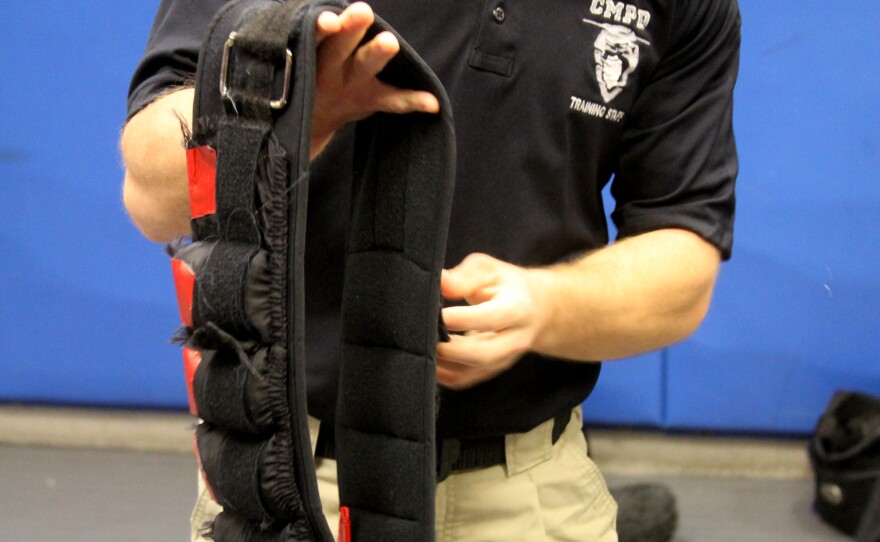Every Wednesday the Charlotte-Mecklenburg Police Department holds a regular briefing with the media at its uptown headquarters. But this Wednesday, the media was invited to the CMPD’s Police Training academy to witness and be a part of an exercise involving police use of force.
Chief Kerr Putney says it’s the first of many trainings the media will be invited to. Reporters were ushered into a room that looked similar to a high school wrestling room, blue mats hung on the wall and in bold lettering "Charlotte Mecklenburg Police Training Academy."
Several reporters volunteered for the training exercise, including WFAE’s Tom Bullock. Their first task was to simulate handcuffing a CMPD officer-in-training, who was acting as a suspect resisting arrest by putting their hands behind their back.
It’s harder than it looks, which was part of the point of this exercise. Reporters participating wore belts weighing about 10 pounds to account for the utility belt officers have to wear.
Mayor Jennifer Roberts, Councilwoman Julie Eiselt, and Chief Kerr Putney observed the exercise. When asked why hold these trainings now, Putney said CMPD wants to learn and improve, but it also wants the media to understand the perspective of an officer.
"I think the only way to really learn something is to do it," Puntey said. "Get your hands dirty and your heart rate up a little bit. Our people do this every day, day in and day out, and they are critiqued and criticized. That’s OK. I prefer it to be when you have context."
One of the many questions reporters asked CMPD during the exercise was about language barriers. If a suspect doesn’t fully understand the commands police are giving, how will that affect the encounter?
Officer Danny Hernandez said there are about 10 to 15 phrases officers are trained to use to communicate in situations where a language barrier is an issue. Situations like the shooting of Rueben Galindo, 29-year-old Hispanic male, who was shot and killed by police last month. Officer David Guerra had shouted 'manos, manos' at him (hands, hands!). Galindo had raised his hands in an outreached V before he was killed. Police say he was holding a gun but it wasn't loaded.
Hernandez says CMPD is making changes to key Spanish phrases taught to cadets.
"Before it would have been 'monos arriba,' which means hands up but not drop the gun," Hernandez said.
Hernandez says the phrase “drop the gun” is now being taught to current cadets in Spanish.






